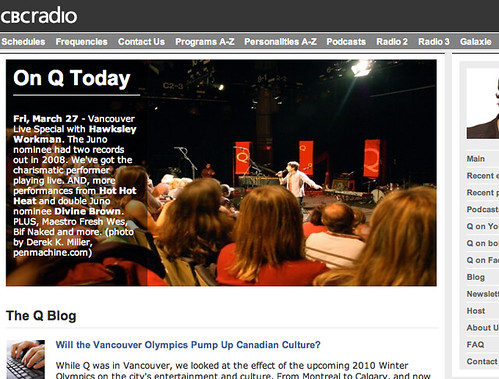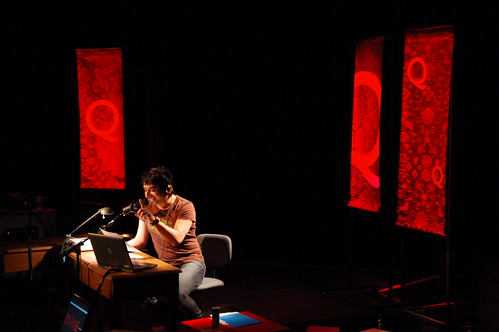Penmachine
18 November 2009
My interview last week on CBC TV
Last week, reporter Theresa Lalonde from CBC interviewed me at my house about how people can plan for what to do with their online presence after they die. The TV video report is now online, and soon I'll post the audio radio versions she did as well.
The topic is similar to a much longer interview I had with Nora Young at CBC's "Spark" last year. There are basically two components to the whole enterprise: figuring out which online activities of yours to shut down and how, and figuring out which ones to keep going and how.
Labels: cancer, cbc, death, radio, television, video
02 November 2009
Listen to the Salish Sea
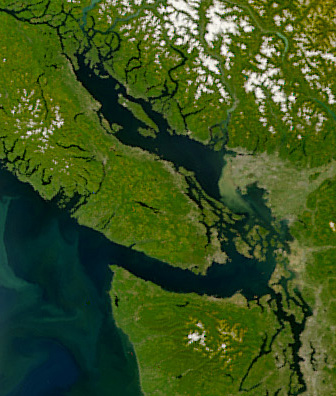 When I interviewed CBC Radio producer Paolo Pietropaolo back in January on the Inside Home Recording podcast, he talked about his upcoming documentary on the Salish Sea here in British Columbia.
When I interviewed CBC Radio producer Paolo Pietropaolo back in January on the Inside Home Recording podcast, he talked about his upcoming documentary on the Salish Sea here in British Columbia.
The original version appeared in the spring, and a documentary edition was broadcast this morning on the Canada-wide radio show "The Current." You can listen to both. They might work best in headphones, even though they weren't broadcast in stereo.
Labels: canada, cbc, environment, history, oceans, radio, seattle, vancouver
31 October 2009
Links of interest (2009-10-31):

- The rotor on the new Grouse Mountain wind turbine is turning very slowly, first time I've seen it move. Must be testing.
- Notice that when they have all those many layers on, supermodels almost look like normal people?
- Sydney, Australia covered the road of the Harbour Bridge with grass and cows, and 6000 people had a picnic.
- "No child has been poisoned by a stranger's goodies on Halloween, ever, as far as we can determine."
- Brent Simmons on vaccines (via Daring Fireball). I had chicken pox almost as bad, but at 15. My wife Air got shingles in '04. I'm flad the kids will get neither.
- If, like many Canadians, you have a huge voice crush on Nora Young, then this audio from CBC's Spark will slay you.
- Awesome song flowcharts for "Total Eclipse of the Heart" and "Hey Jude."
- Dan Savage is always so cheecky: "I don't believe that couples who make the choice to be monogamous should be discriminated against in any way."
- Archaeology doc "The Link" a few months ago was full of needless hype. Discovery Channel's "Discovering Ardi" shows how it's done properly.
- "I'm all for winging it, but saying 'I'm not really prepared' to an audience shows them the ultimate disrespect."
- Some interesting iPhone photography apps.
- Dark areas on this world map are the most remote from a city. No Antarctica, though.
- A new deal today with the Cowichan band means you'll be able to buy real sweaters at HBC Olympic store.
- Twelve images showing how vastly digital imaging has improved astrophotography on the ground and in space since 1974.
- Seven questions that keep physicists awake at night (still lots to learn, which is great).
- First-ever Lip Gloss and Laptops video podcast (for Halloween).
- American Samoa could have had a tsunami warning system, but funds were frozen in 2007 because of waste and corruption.
- Telus is selling iPhones in Canada Thursday of this week (Nov 5). Pricing is basically the same as Rogers/Fido (no surprise).
- The opposing Canadian "No TV Tax" vs. "Local TV Matters" ads are indistinguishable, obnoxious, and make both sides look like shitheads. Makes me want to go out and get some man-on-the-street interviews. "Excuse me, ma'am, did you know that both the TV networks and the cable companies are wasting money on advertising instead of trying to make better programming, using fake man-on-the-street interviews to try to confuse you about their own pissing contest? What do you think of that?"
- Here's a flu primer. The October 25 edition of CBC's "Cross Country Checkup" (MP3) is also good. Here's a slightly contrary position, and a more general one about the dangers of not vaccinating. Wired also has a cover story on the topic.
- Weird Al's relentless perfectionism in the studio (love when he gets a headache trying to channel Zack de le Rocha).
- As of today it's been 32 years since the last case of smallpox in the world was eliminated by vaccination.
- The 27" iMac has a shockingly low price for what you get - even for the LCD panel alone (via Dave Winer).
- Dave Winer also notes why death of a parent can make you grown up. My parents are alive, and doing great (better than me!).
- I like Barbara Ehrenreich's new book, though I haven't read it yet.
- Two people I know both had cancer surgery the same day, this past Monday.
- Top 10 Internet rules (via Raincoaster).
- $400 is expensive, but if you make serious video with a DSLR, I bet this LCD viewfinder is worth it (via Scott Bourne).
- Having to medivac a sailor from a US Navy submarine to a helicopter offshore is hairy and dangerous business!
- As Paul Thurrott said, people are going to be wandering into Microsoft's new store all the time and asking, "Excuse me, where are the iPods?"
- "If what you're doing does make sense, then, for Christ's sake, talk like a human being."
- From Psychology Today in 2008, ten ways we get the odds wrong on risk.
- You can now buy the whole Abbey Road album for Beatles Rock Band.
- Daughter M just described a fever-induced time dilation hallucination identical to mine from childhood. Never thought anyone would understand!
- Red Javelin Communications is apparently working with my company Navarik, but I'm finding their website rather too buzzwordy for my taste.
- Research in Motion. Oh, what will we do with you and your fine, fine, not-at-all-dirty URL http://rim.jobs?
- A great (much improved) update by Billy Wilson to my very popular "All the Current DLSRs" camera collage.
- Here's a sign of flu in our neighbourhood: our local Shoppers Drug Mart was entirely sold out of hand sanitizer. Both my kids were stricken, but I avoided it.
- Noya sings with my band sometimes. Here's her solo video.
- Another Ralph Lauren Photoshop disaster.
- The Diamond Dave Soundboard is still genius.
- As always, Saturn's rings and moons are some of the strangest and most beautiful things you can see.
Labels: australia, beatles, cbc, environment, evolution, holiday, lipglossandlaptops, microsoft, photography, podcast, sex, vancouver, video
08 June 2009
I'll be on CBC Radio again at 5:40 today
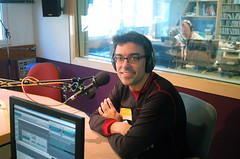 I'll be on the radio again, but it's not about cancer this time—I get to nerd out instead! This afternoon, CBC Radio Vancouver's "On the Coast" drivetime show will be talking about the City of New Westminster's feasibility study/pilot project to create a citywide Wi-Fi network (from the May 11 New West council meeting). I'll be on the panel by phone, not in the studio as in the photo.
I'll be on the radio again, but it's not about cancer this time—I get to nerd out instead! This afternoon, CBC Radio Vancouver's "On the Coast" drivetime show will be talking about the City of New Westminster's feasibility study/pilot project to create a citywide Wi-Fi network (from the May 11 New West council meeting). I'll be on the panel by phone, not in the studio as in the photo.
UPDATE: Audio of my interview is now available at my podcast. You can also grab the MP3 file directly (2.3 MB).
The broadcast panel begins at 5:40 p.m. Pacific Time on 690 FM or 88.1 FM in Vancouver, or you can listen to it online. I'll try to record the stream and post the panel to my podcast shortly. Municipal Wi-Fi was a big idea a few years ago, but many of the utopian early predictions of free wireless service across big cities haven't panned out, and the rise of high-speed cellular data coverage (such as with the iPhone), more free hotspots in cafés and such, and commercial WiMAX networks like Rogers Portable Internet have made it seem a little less necessary.
If you have any thoughts about this topic that you think I should address on the air, leave a comment below, email me, or send me a message on Twitter in the next couple of hours and I'll see if I can incorporate your ideas.
Labels: cbc, geekery, penmachinepodcast, radio, vancouver, web
02 June 2009
Those damned angry atheists
Christopher Hitchens was his usual bombastic and arrogant self on CBC's "Q" today (MP3 file). That's no surprise, since he is perhaps the angriest—or at least the most provocative—of the angry New Atheists who have had bestselling books over the past few years. Many religious people, and a good number of my fellow atheists too, think Hitchens's take-no-prisoners approach is wrong and counterproductive. Why, they ask, should atheists antagonize believers the way he and others, like Richard Dawkins, do?
"Q" host Jian Ghomeshi asked Hitchens a similar question today:
Tell me who you think your audience is, because you're quite aggressive with your argument. [...] If you really want to change things, it might take some effort to overcome organized religion in the world, but I'm wondering if [...] being a little softer in your approach might be more effective?
It's true that most atheists would prefer to be more conciliatory towards the world's religious majorities. But I think Hitchens and his compatriots serve a valuable purpose. With their polemics, their public profiles, indeed with their anger, they have made atheism visible in this new century, especially in America. Without them, we might not have heard Barack Obama's acknowledgment of non-believers in his inaugural address.
The angry New Atheists are like the activist vanguard of the LGBT rights movement, and of other civil rights movements before it. Not every gay person wants to march in protests, or make films outing hypocritical homosexual politicians. But the demands and self-righteousness of the vanguard are why same-sex marriage is a reality in Canada, and in several European countries and American states, today, rather than decades from now.
I grew up in an ostensibly secular Canada in the '70s, but we still said a prayer every morning in public school, and the Lord's Day Act prevented stores from opening on Sunday. Those rituals didn't offend me at the time, but as a non-religious youngster, I still felt like an outsider. The assumption seemed to be not only that everyone was religious, but that we were all Christians too. That has changed, largely because of Canada's increasing multiculturality.
High-profile writers like Hitchens and Salman Rushdie and Douglas Adams and Barbara Ehrenreich; scientists like Richard Dawkins and David Suzuki and Richard Feynman; comedians like Julia Sweeney and Ricky Gervais and George Carlin; musicians like Ani DiFranco and Mick Jagger and Eddie Vedder; actors like Omar Sharif and Eva Green and Emma Thompson and Ian McKellen and Katharine Hepburn; and others from Penn and Teller to Linus Torvalds to the MythBusters to Nigella Lawson—around the world, all profess their atheism.
In doing so, they affirm that the non-religious and non-spiritual among us are part of the full and honourable diversity of human society. So the audience for Christopher Hitchens need not be religious people he is trying to de-convert (even if that is his goal). Rather, it can be the millions of us who believe in no gods or spirits, and who are comfortable saying so, because Hitchens is shouting it too.
UPDATE: Biologist Jerry Coyne, who is outspoken in his assertion that science and religion are incompatible, has an interesting post on this same topic.
Labels: cbc, controversy, radio, religion, writing
01 June 2009
Search Engine moves to TVO
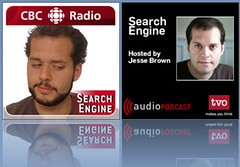 Last year, I wrote about CBC's two radio tech shows, "Spark" and "Search Engine", and how they were sometimes hard to tell apart. CBC management felt the same—"Search Engine" was downgraded from a full radio show to a podcast only last year, and recently got cancelled altogether, despite being one of the network's most popular podcasts.
Last year, I wrote about CBC's two radio tech shows, "Spark" and "Search Engine", and how they were sometimes hard to tell apart. CBC management felt the same—"Search Engine" was downgraded from a full radio show to a podcast only last year, and recently got cancelled altogether, despite being one of the network's most popular podcasts.
Fortunately, TVOntario picked it up, and host Jesse Brown has now put out two episodes at the podcast's new home. (You can subscribe using the RSS feed or at iTunes.) The Facebook group stays the same, with the new name. If you were a "Search Engine" listener before, I encourage you to subscribe at the new feed.
And I do have to say, Brown's new clean-shaven look is a big improvement over his old scruffy '70s rock star beard.
P.S. "Spark," to which I've occasionally contributed, continues on at CBC, and is growing from a half-hour show to a full hour on the radio in the fall.
Labels: cbc, facebook, geekery, podcast, radio
27 March 2009
My photo on the Q home page
After I took some pictures of the taping of CBC's "Q" last night, I let CBC know about them, and this morning, here was the result:
That's my photo as the headline picture on the "Q" home page. You can also listen to the podcast version (MP3 file) of the episode.
Labels: band, cbc, music, photography, podcast, radio, vancouver
26 March 2009
Being in the audience for Q
CBC Radio's "Q" is a national, Toronto-based, daily arts, culture, and entertainment show hosted by Jian Ghomeshi. For some reason I don't quite understand, I wasn't too fond of him before—I'd garnered a bad impression and it just stuck with me. (Maybe it was a Moxy Früvous hangover.)
Anyway, tonight my daughter M and I trotted down to the CBC building in Vancouver for a live-in-front-of-an-audience taping of "Q," to be broadcast on the radio tomorrow. The show has been in Vancouver all week before the Juno Awards (Canada's equivalent to the Grammys) on Sunday, which my wife and I will be attending. I took some photos:
Musical acts performing tonight included Hawksley Workman, Divine Brown, and Hot Hot Heat. Bif Naked also dropped in for an interview, as did Torquil Campbell of Stars. And I have to say, in person Ghomeshi is engaging, open, and personable. I think I've become a fan.
Labels: band, cbc, music, radio, vancouver
25 January 2009
Faster than anybody expected
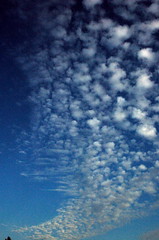 By the way, if you're in a mood to be scared, forget about Saw V or The Uninvited or The Unborn or My Bloody Valentine 3D. Listen to Climate Wars on CBC's always excellent radio show "Ideas."
By the way, if you're in a mood to be scared, forget about Saw V or The Uninvited or The Unborn or My Bloody Valentine 3D. Listen to Climate Wars on CBC's always excellent radio show "Ideas."
In fact, listen to Gwynne Dyer's documentary anyway (it's on the podcast), whether you want to be scared or not. The key statement:
Everything that is expected to result from global climate change driven by greenhouse gases is not only happening, but it's happening faster than anybody expected.
Learn why, and how global warming and climate change, which should rationally be non-political, became a political and ideological issue anyway, and what might happen—including some potentially nasty wars. Ignore anything else I've been pointing you to. Really. Just listen.
Links of interest (2009-01-25):
- How to Spot a Canadian (in the vein of Stuff White People Like).
- Playing the Beatles Backwards, a subjective ranking of all 185 original Beatles songs in reverse order of quality.
- A great list of single words to replace blathery phrases, which will make your writing and speaking better (via Dave Winer).
- Gnomedex 9 is happening in Seattle in August. My wife Air and I are both going. Register early and you'll get $100 USD off. There's also a Facebook event page and Flickr photo group.
- For CBC fans: Jian "Q" Ghomeshi, George "Strombo" Stroumboulopoulos, or Ian "Handsome Man Thing" Hanomansing? Your choice? Reasons?
Labels: band, cbc, gnomedex, humour, music, writing
06 November 2008
Audio of my CBC interview
If you missed my interview on CBC Radio earlier today, I have an MP3 file of it available now (5.2 MB, about 12 minutes). I spoke with host Stephen Quinn about all the drastic stuff I've been through since June 2007, including my major surgeries and several chemotherapy regimes, as well as the new phase of my cancer treatment, that of living with the disease rather than simply trying to destroy it.
Incidentally, I had intended on publishing the audio to my Penmachine Podcast too, but Apple's iWeb software, which I use for that, has a nasty bug that's been around since April, and which doesn't seem any closer to being fixed. It prevents me from updating the podcast without a lot of extra work, so I think I'll just plan to switch over to a less awkward podcasting tool in the near future. I'll let you know when that happens—and I'll have some new original music to post there too.
Finally, a new episode of Inside Home Recording should be online tomorrow too.
Labels: apple, cancer, cbc, ego, insidehomerecording, podcast, radio, software, web
I'll be on CBC Radio again this afternoon
AUDIO ONLINE: I've posted audio from the interview online late this evening, in case you missed the broadcast.
 For the first time in almost a year and a half, I'll be appearing on CBC Radio Vancouver's On the Coast afternoon drive-time show to talk about my ongoing cancer treatment, this time with new host Stephen Quinn.
For the first time in almost a year and a half, I'll be appearing on CBC Radio Vancouver's On the Coast afternoon drive-time show to talk about my ongoing cancer treatment, this time with new host Stephen Quinn.
I'm recording the interview this morning, but it will go to air later this afternoon—I'll update this post once I find out precisely when. If you're not in broadcast range of CBC Vancouver in southwestern B.C. (690 AM in Vancouver, also currently experimentally at 88.1 FM), you can listen to the high bandwidth or low bandwidth Windows Media stream (Mac users can use the free Flip4Mac plugin).
UPDATE: My interview, recorded before lunchtime this morning, will be broadcast just after the 5 o'clock news today, around 5:10 p.m.
I'll do my best to post the audio to my podcast afterwards as well. You might also want to listen to a related interview I gave to the national CBC Radio show Spark this last spring, which was rebroadcast just a few weeks ago too.
Labels: cancer, cbc, ego, radio, vancouver
23 June 2008
Sayonara, "Search Engine"
A couple of months ago I noted that the Canadian Broadcasting Corporation has two technology-focused radio shows, "Spark" and "Search Engine," and that I couldn't always figure out how they were supposed to differ. (In the comments, Darren Barefoot noted that one way to tell is that "'Search Engine' almost always comes with a sense of righteous indignation, which gets a bit old after a while.")
It looks like CBC also wondered why they had both shows, and has now dissolved "Search Engine" as a radio show by having host Jesse Brown report on technology for other CBC Radio programs. This despite "Search Engine" being one of the network's most-downloaded podcasts. So there will still be a compilation podcast, and the blog will continue too.
That's not a bad solution. Of the two shows, I prefer Nora Young's lifestyle-focused "Spark" over Brown's more politically obsessed "Search Engine" anyway, and "Spark" is coming back in much the same form as before. "Search Engine" will be quite different, since Brown will be working on his own without a team of correspondents, producers, and researchers. We'll see how that goes.
It's worth listening to the last regular show of "Search Engine," however. In it, Brown interviews Canadian Industry Minister Jim Prentice about the lousy new Canadian copyright legislation currently before the House of Commons. Prentice doesn't come across well—but in this case, I think the righteous indignation is appropriate.
Labels: cbc, controversy, copyright, government, podcast, radio
29 April 2008
Edited "Spark" interview now available
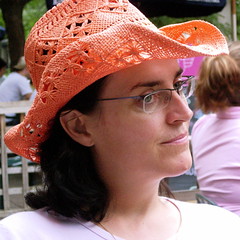 You already heard the full-length unedited version of my interview with Nora Young (pictured) of CBC Radio's "Spark." Now here's the edited version in the latest complete episode of the show, with extra bonus material including me reading some of my blog posts, and my podsafe tune "Striking Silver" as background music.
You already heard the full-length unedited version of my interview with Nora Young (pictured) of CBC Radio's "Spark." Now here's the edited version in the latest complete episode of the show, with extra bonus material including me reading some of my blog posts, and my podsafe tune "Striking Silver" as background music.
You can download the whole episode as an MP3 file, or if you're subscribed to the Spark podcast, you'll get it automatically. If you prefer to hear "Spark" on the radio, it airs Wednesday, April 30 (tomorrow) at 11:30 a.m. and Saturday, May 3 at 4:00 p.m. (a half hour later in Newfoundland, of course), on CBC's Radio One network, which is 690 AM in Vancouver. This episode also features internetfamous blogebrities such as Merlin Mann and Amber Mac.
Finally, if you have any doubt at all that "Spark" is a cool show, they just received a promo message recorded by freakin' Strong Bad! How awesome is that? (MP3 also available.)
Labels: cbc, ego, podcast, radio
25 April 2008
Full length "Spark" interview available already
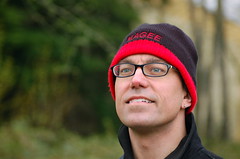 As part of my slightly twisted effort to use my cancer treatment as leverage to get me the kind of exposure and fame my more modest general talents haven't done, I was interviewed on Wednesday for the show "Spark" on CBC Radio (as I've already flogged).
As part of my slightly twisted effort to use my cancer treatment as leverage to get me the kind of exposure and fame my more modest general talents haven't done, I was interviewed on Wednesday for the show "Spark" on CBC Radio (as I've already flogged).
You can now hear the full-length talk between me and the always sultry-voiced Nora Young—a voice made even huskier by her fighting a cold at the time. Here's a direct link to the MP3 file (24 minutes, about 33 MB) too. I'll probably link that up at my podcast after the edited version goes to air next week.
I like that "Spark" doesn't have the traditional media attitude of holding on to its source material like a state secret. It's unusual enough for a radio or TV program, publicly funded or not, to post full-length versions of edited interviews online. But to do it days before the final version appears is still more innovative. I'm not sure I'd even do that.
Labels: cbc, ego, podcast, radio
18 April 2008
The breadth of Ideas
While I'm on this CBC kick, I may as well mention "Ideas," which is surely one of the best radio shows in the world. It has been running in some form or another since 1965.
Every weekday on the radio, and weekly on its podcast, the program spends an hour delving deeply into its title. Its documentary producers talk to politicians, physicians, scientists, theologians, philosophers, poets, artists, writers, historians, and others about topics as diverse as China's 15th century naval fleet, the modern relevance of Don Quixote, theoretical physics, Picasso and the musical avant-garde in Paris during the 1920s, and golf.
And that's just this week. I heard bits (alas, only bits) of the Chinese navy broadcast last night while I was running errands, and was entranced. I sat in the drugstore parking lot for a few minutes because I couldn't tear myself away.
There is a separate feature page (with RealAudio streams! Who still uses that?) and podcast (with proper MP3s) for the ongoing series "How to Think About Science," which started last year. There are already 17 hours in that group of shows alone.
"Ideas" will grow your brain. I recommend you dedicate some time to it.
Labels: cbc, podcast, radio, science
What blog posts should I read on the radio?
Now that I'm going to be on the radio, again, "Spark" host Nora Young has asked me to pick a couple of my blog posts that I can read out (at least an excerpt, if it's a longer entry) on air—one related to my cancer treatment, one not. I just did a quick skim through and found a few candidates.
If you have a bit of time, take a look and tell me in the comments which of each type you think might sound good on the radio:
Cancer posts
- Dead man walking
- Know your limit
- Bandages and partners
- Needle boy
- Braveblogging
- My least favourite part of town
Non-cancer posts
- "Crouching Tiger" would have made a better "Star Wars"
- Buying my dad a lens
- How a rotary phone is better than a cell
- Meeting up with the geeks
- My first toolbox
- Getting a good baby passport photo
- My daughter's cool glasses
- Can you make money from blogging and podcasting?
And of course, if you prefer something else I've written, let me know. Thanks!
Labels: blog, cancer, cbc, ego, geekery, radio
17 April 2008
Spark me up
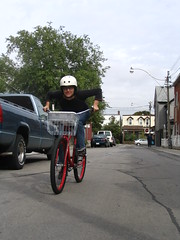 CBC Radio has two programs (also available as podcasts) that confuse me a little: "Spark" and "Search Engine." I like them both, but they seem to cover a lot of the same territory of life in the digital age. Sometimes I can't remember which one had a particular segment—was it host Nora Young at "Spark" who interviewed the guy who edits Hillary Clinton's Wikipedia entry? No, it was host Jesse Brown from "Search Engine."
CBC Radio has two programs (also available as podcasts) that confuse me a little: "Spark" and "Search Engine." I like them both, but they seem to cover a lot of the same territory of life in the digital age. Sometimes I can't remember which one had a particular segment—was it host Nora Young at "Spark" who interviewed the guy who edits Hillary Clinton's Wikipedia entry? No, it was host Jesse Brown from "Search Engine."
I suppose it doesn't matter. I'm glad there's enough of an audience for my kind of techie social nerdity that CBC has two shows about it. Yay again to Tod for helping the network get on the podcasting train after jump-starting it with the CBC Unplugged show almost three years ago.
Anyway, I'm going to call "Spark" my favourite of the two shows now, because it looks like I'm going to be on it. Nora—that's her on the bike—indirectly heard about my recent talk on life, death, and my blog, and contacted me through Facebook (appropriately enough) to see if I might like to be on "Spark."
One of my weaknesses is appearing in the media. I've always loved seeing my name in print, or being on the radio or TV. So my immediate thought was, "hell yeah!" We'll likely record something next week for the "Spark" episode airing (and podcasting) at the end of the month. More details to follow.
Incidentally, Nora's other podcast, The Sniffer (not affiliated with the CBC), has been on my subscription list for a couple of years now. I recommend it.
Labels: blog, cancer, cbc, ego, facebook, geekery, podcast, radio
05 April 2008
Fifty years after Ripple Rock
 Back in the late 1950s, my mom worked for CBC Television here in Vancouver. One of the biggest events the network covered at that time took place 50 years ago today in the waters near Campbell River, B.C. on Vancouver Island: the Ripple Rock detonation, one of the largest artificial non-nuclear explosions ever created.
Back in the late 1950s, my mom worked for CBC Television here in Vancouver. One of the biggest events the network covered at that time took place 50 years ago today in the waters near Campbell River, B.C. on Vancouver Island: the Ripple Rock detonation, one of the largest artificial non-nuclear explosions ever created.
As described (and diagrammed) at The Taming of the Rock, the project was a huge effort, designed to remove the deadly navigation hazard of an underwater mountain in the middle of the Inside Passage. Nearly 1400 tons of Nitramex explosives were packed into chambers dug into Ripple Rock's twin peaks—not from above, but by miners who dug a vertical channel down to bedrock on neighbouring Maud Island, then a horizontal one underneath the seafloor across to Ripple Rock, then up again to the blast zones. Like a root canal. The digging took more than two years.
The explosion itself shortened the underwater peaks by almost 12 metres, making the channel at Seymour Narrows much more navigable and reducing some of the fearsome tidal currents and whirlpools that Ripple Rock used to generate. (The tides in this part of the world are some of the most powerful on earth anyway—in a shallow constriction, they can be as fierce as a whitewater river.)
You can watch CBC TV's archived live coverage of the event from April 5, 1958. My mother's friend Erlyne was one of the few women on that TV crew, though she's not part of the recording. She and my mom met at the CBC, and are still friends 50 years later.
Labels: cbc, history, ripplerock, television
20 January 2008
Yay for the indoor kids
 Our pal Kerry Anne (left) was one of the team of kick-ass bloggers who swept the CBC Test the Nation 21st century trivia game show tonight on national television. Of course, who do you call if you want trivia? Chefs? Flight crews? Celebrity impersonators? Cabbies? Backpackers? No! You call the bloggers!
Our pal Kerry Anne (left) was one of the team of kick-ass bloggers who swept the CBC Test the Nation 21st century trivia game show tonight on national television. Of course, who do you call if you want trivia? Chefs? Flight crews? Celebrity impersonators? Cabbies? Backpackers? No! You call the bloggers!
It was an impressive showing, with a team average of 50 out of 60 questions correct (83%), a blogger (Rick Spence) with the highest individual score (57 of 60, or 95% correct), and the team's celebrity endorsee Samantha Bee (of The Daily Show) also scoring highest among the celebrity panel, with 49 out of 60. You can read more from Miss 604, Calgary Grit, and Mighty God King—and surely dozens of other blogs by now.
UPDATE: Unsweetened.ca has a big ol' list of blog reactions. And the CBC Test the Nation blog and Buzz Bishop have way more.
Nice job, KA and crew. And you didn't even have to wear jumpsuits, chef's whites, or Borat costumes.
Labels: blog, cbc, friends, lipglossandlaptops, television, web
19 December 2007
How to take better Christmas photos
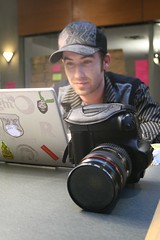 Our handsome pal Kris "kk+" Krug just did an interview on CBC Radio's On the Coast with lots of cool tips on how to take better holiday photos.
Our handsome pal Kris "kk+" Krug just did an interview on CBC Radio's On the Coast with lots of cool tips on how to take better holiday photos.
He knows how to take the pictures, so his advice is worth following. You don't need the big monster camera like his, by the way.
I'm also fond of the holiday eating tips ("If something comes with gravy, use it. That’s the whole point of gravy.") passed along by Arieanna, who also got an insanely huge Christmas tree this year.
Finally, don't forget the Mythbusters Christmas Rube Goldberg Machine:
It has Diet Coke and Mentos, as well as a holiday beef roast propelled right out of an oven. Thanks to my daughters for finding that one.
Labels: cbc, flickr, food, holiday, kriskrug, mythbusters, photography, radio, television
25 October 2007
How to read the Bible
There's been a bit of a buzz recently about the book The Year of Living Biblically, where author A.J. Jacobs, an agnostic Jew, chose to live by all the rules in the Bible (even the obscure ones, and mostly from the Old Testament) as much as he could, for an entire year. The Bible is of course a fascinating book, even for atheists like me, for whom it is not a divine revelation but a magnificent human construction.
Like the Quran, the Hindu Vedas, Buddhist Sutras, the Analects of Kong Fuzi (Confucius), and the myths and stories of everyone from the Egyptians, the Greeks and Romans, and the Norse to the Inca, the Haida, and the vast diaspora of Polynesia, the Bible has profoundly affected, and been the foundation of, huge parts of human culture and history. I know less about it (and those other works) than I should.
I'm not sure Jacobs's book would be my best resource, though I'm sure it's funny and revealing—in a radio interview with Jacobs I heard this morning, I discovered that wearing clothes whose fibres mix wool and linen is apparently forbidden. Daily showers are, however, apparently fine, even though I've heard of some religious Christians and Jews who disdain "bathing for pleasure." And in the Bible (New Testament especially), there appears to be a whole lot more about helping the poor and needy than the behaviour of a lot of people who claim to be literalist Christians would indicate.
Perhaps a better introduction would be How to Read the Bible, by Richard Holloway, the controversial retired Anglican Bishop of Edinburgh. On the most recent CBC "Ideas" podcast, he and Paul Kennedy engage in a fascinating discussion (MP3, available on CD once that MP3 link expires) of his book.
Richard Dawkins, most prominent atheist, was raised Anglican, and he has called Anglicanism a watered-down, weakened strain of the virus he thinks religion is. Holloway surely does not disabuse Dawkins of that assessment, especially when he writes things like:
One of the constant themes of the Bible is the human capacity to get God wrong, which is why the distance between those who believe God is a human invention and those who believe God is real is narrower than we might think.
and:
The afterlife of great texts [like the Bible] eclipses the intention of the original author, even if we think we know what it was.
and:
Retrojecting ideas from a later perspective into the text of the Hebrew Bible became a major enterprise in Christianity, with two branches, historical and theological.
Those are just from the first chapter. I knew nothing about Holloway until I heard the podcast, but I suspect that a lot of believing people—especially those prone to Biblical literalism—no longer consider him a good Anglican, or a good Christian, regardless of his previous senior role in the church.
Now, by nature, I know pretty much nothing about the past 2000 years of Christian theology, just as I am largely ignorant of what intellectuals among Muslims, Hindus, Sikhs, Jews, Zoroastrians, Jains, Buddhists, and others have thought and written about their own faiths—or what modern academics outside those religions have to say about them. I'm not particularly interested in becoming a religious expert either, for even all religions put together are only a part of how humans try to understand and organize the world (not the part that most interests me).
But from what I have heard and read this week, I like Holloway's approach, and will probably read his book at some point, which I guess means I'll need to get to reading that Bible eventually too. From previous comments on this blog (and surely some more to come on this post), a small number of you readers might think doing so will lead to a born-again conversion in me, especially with my cancer and everything now, or that I've already consigned myself to Hell unless I repent pretty darn soon.
If I were you, I wouldn't bet any money on that.
Labels: bible, books, cbc, controversy, podcast, religion, science
30 June 2007
Party tonight, interview posted, rock tomorrow
 Today's my 38th birthday. Thank you to everyone who's wished me well, and to everyone who's coming to the party tonight (and to my wife, who's organizing the whole thing). If you insist on a gift, go to my friend Gillian's donation page for the Underwear Affair cancer fundraising run, which takes place next Saturday, July 7, one day after I get my major surgery. Send some money for research on cancers below the waist. That would be good.
Today's my 38th birthday. Thank you to everyone who's wished me well, and to everyone who's coming to the party tonight (and to my wife, who's organizing the whole thing). If you insist on a gift, go to my friend Gillian's donation page for the Underwear Affair cancer fundraising run, which takes place next Saturday, July 7, one day after I get my major surgery. Send some money for research on cancers below the waist. That would be good.
If you missed the interview my wife and I had with Paul Grant on CBC Radio yesterday, I've now posted the audio to my podcast (MP3 file). Thanks to my dad for recording it. I think our podcasting experience pays off—we sound pretty good on air.
Also one more reminder that at the HBC Run For Canada tomorrow, my band will be playing at the start/finish zone on Coal Harbour near the north foot of Jervis Street in downtown Vancouver, between 9 a.m. and around noon. With upcoming surgery and stuff, it will be my last performance with the group for some time, so if you're up for some rock 'n' roll in the morning, that's a good chance for a free show and to see me play the drums.
Finally, thank you Alistair for finding the bizarre birthday photo that accompanies this post. I am not a walrus, but do I still get the bucket of fish?
Labels: band, cancer, cbc, music, podcast, radio
28 June 2007
Gonna be on CBC Radio again on Friday
Speaking of seeking attention, I'll be making my third appearance on CBC Radio's On the Coast afternoon drivetime AM radio show tomorrow (Friday) afternoon after the 5 p.m. news.
If you happen to listen to it on the radio (AM 690 in Vancouver) or via the live online stream, available in high bandwidth (direct file link) or low bandwidth (direct file link) (Windows Media format), and if you get a chance to record it, I'd appreciate a copy. I'm on the air almost as much as Tod these days, although of course he gets paid for it.
My wife will also be joining me on the show for the first time. We'll be talking about my cancer and how the news has just kept getting worse, but I continue to blog about it. Listen in if you can.
Labels: cancer, cbc, ego, family, radio, todmaffin
03 May 2007
I play a Facebook skeptic on the radio
Last week I mentioned that I'm not using Facebook yet, and why. My wife does use it, and likes it. So CBC technology columnist Tod Maffin interviewed both of us about it. You can listen to his mini-documentary (MP3 file) as part of his Todbits podcast, or you might have heard it on CBC radio today.
I have to say that the peer pressure for me to get on Facebook is certainly an order of magnitude stronger than it has been for other social networking sites (except maybe, briefly, Twitter)—but I'm still holding out. I'm busy enough now as it is.
Labels: cbc, ego, facebook, radio, todmaffin
